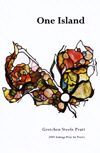One Island
Tony Hoagland selected One Island for the 2009 Robert Dana Prize for Poetry, and it’s indisputably a winner of a book. Pratt is a masterful poet, although her effectiveness is—in the happiest of ways—difficult to describe. Exploiting poetry’s most powerful and effective strategies (economy of language; unusual syntactical arrangements; unexpected, but comprehensible, combinations of words and phrases; a heightened sense of sound and rhythm, among them), the poet turns the ordinary into the oddly exceptional and, often, the exceptionally odd. The book’s opening line, for starters: “The past is a humidity.”
Tony Hoagland selected One Island for the 2009 Robert Dana Prize for Poetry, and it’s indisputably a winner of a book. Pratt is a masterful poet, although her effectiveness is—in the happiest of ways—difficult to describe. Exploiting poetry’s most powerful and effective strategies (economy of language; unusual syntactical arrangements; unexpected, but comprehensible, combinations of words and phrases; a heightened sense of sound and rhythm, among them), the poet turns the ordinary into the oddly exceptional and, often, the exceptionally odd. The book’s opening line, for starters: “The past is a humidity.”
Pratt exploits to great advantage one of poetry’s most potent (and, all too often these days, I find, under-practiced) tactics: precision. In fact, I would say that it’s the oddly exceptional/exceptionally odd to which I refer above that is largely responsible for the way in which the images in this slender volume are carefully managed to evoke responses of great specificity. Here are the opening lines of “Road Rising into Deep Grass”:
All I know about barns I know
From the highway. They apple
The horizon with their fragrant
Rotting. Yesterday, I was in love
So the barns disheveled themselves
Noun as verb (to “apple the horizon”) becomes an unforgettable visual image, small barns dotting the view the way apples in the orchard, seen from a distance, dot the rows of trees, unrecognizable except as shape and color, taking up space, almost as an abstract design. The barns smell like apples (fragrant with rotting), ripe with unknown/imagined stories and history (“All I know of barns I know from the highway”). Adjective as verb (“barns disheveled themselves”) heightens the act of the disheveling, again bringing precision to the act and the emotions evoked.
The poet is, as it happens, conscious of her own quest for precision in “I Try to Hear the Island Disappearing”:
To hear cigarette as only a sound, some
of those ashes on red leather,
Wild rose and no taste of fuchsia petals between my teeth,
bathing suits drying on the rocks –
And tapdance free of the clicking in Helene’s basement,
her red hair, it all coming undone.
Highway empty of the cold, all those songs,
asphalt buckled with frost
Here is the poet on the road again (highway), disheveling the memories (“coming undone,” “buckled with frost”), listening hard for the unique and distinct sounds of her own stories, and—precisely—only the sounds (“only a sound, none of those ashes”). Of course that quest for precision in one sense (sense as meaning, and sense as type) has given us precise visual images, too (the red leather, the red hair, tap shoes, frost on pavement). Finally, here is the poet, summing up her own poem’s efforts:
To hear the clear absence of a life –
to stand under the streetlamp
Without any snow sifting down through the orange light,
without any histories stapled to the telephone pole.
Not only have these precise sounds and sights added up to an impossibly present sense of “absence” (missing), that absence is now complicated by a history we could not have foreseen or guessed, a life story stapled to a telephone pole (as in gone missing). Death, yes (“Let cemetery mean nothing”); disappeared (and I hear that precise word’s new precise echo in the poem’s title now), unexpected, startling, desperately, brilliantly sad. I would be tempted to say this is one of the most expertly crafted poems in the volume, if there weren’t a whole volume of others equally effective and effecting.
And she saves the best for last, “One Island” (after Neruda), a series of 20 poems of couplets, each of which begins with an italicized question (“Why did I return to the indifference of limitless ocean?”; “Do thoughts of love fall into extinct volcanoes?”). In these poems, Pratt demonstrates that it is, indeed, possible to tell a family story, a personal story, in poetry—to craft a narrative while relying on poetry’s unique strengths and appeal (as described earlier in this review). Poetry is not, in fact, lines of prose broken up across a page to fool us into believing it is not prose. It is truly another endeavor altogether: “Do you not see a threat in the bloody silk of the poppy?”
To close this all too brief review, I return to Pratt’s opening poem, “Rodman’s Hollow,” in which she anticipates these poems’ controlled, yet often overwhelming emotion (I am tempted to say sadness) and announces what drives (those highways) One Island: “On this blue planet – Oh life enough!” With poems like these, life does—almost, almost—seem enough.





